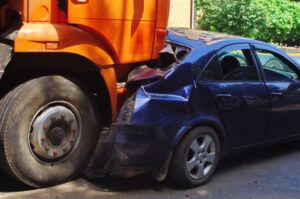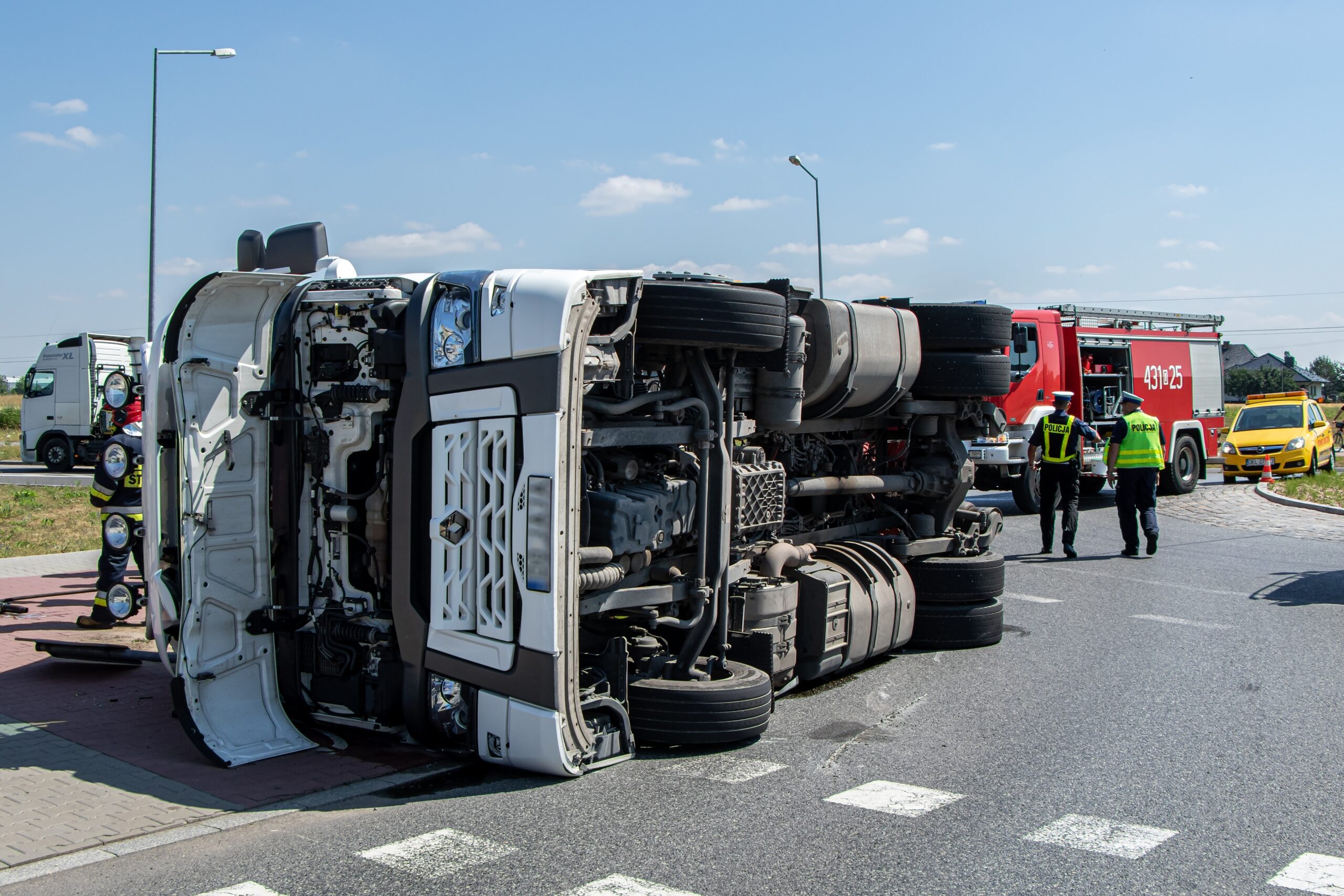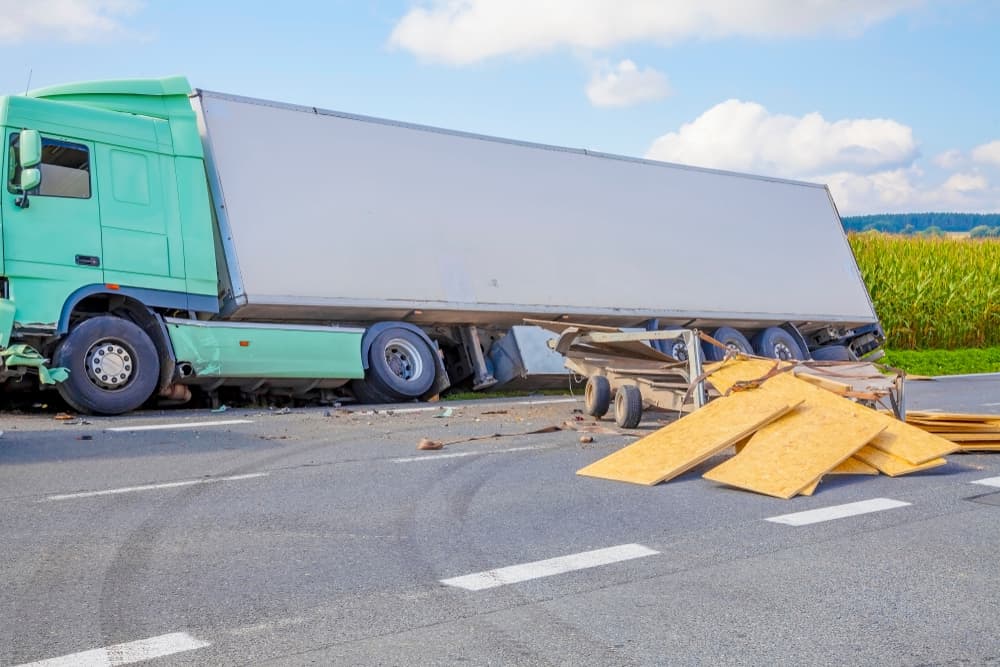Big rigs are large, heavy, dangerous vehicles. As such, you can expect severe injuries and significant property damage in truck accidents.
Suppose you were involved in a truck crash arising from the negligent actions or inactions of a trucker, trucking company, or another party. In that case, you may receive compensation for your losses.
Filing a truck accident lawsuit requires careful planning, legal experience, and an understanding of the relevant laws. Whether you file a truck accident lawsuit to protect your rights and pursue fair compensation or settle outside of court, you can maximize your compensation by hiring a skilled truck accident attorney to represent you.
Seek Medical Attention
Before taking legal action or hiring an attorney, prioritize your health and safety. If you or anyone else in the truck accident sustained injuries, seek immediate medical attention for your well-being. This also creates a medical record you need for your truck accident claim.

Even if you don't have pain or other symptoms right away, the accident could have injured you. For example, internal bleeding, organ damage, head injuries, and back and neck injuries don't always reveal symptoms immediately.
In addition, once you have been treated and stabilized for your injuries, continue to follow your doctor's orders and treatment plan. You need to do this not only for your health but also to show that you take your injuries seriously and are willing to do what it takes to get better. If you refuse to follow your treatment plan or doctor's advice, you could give the insurance company a reason to deny or devalue your claim.
CONSULT WITH AN EXPERIENCED TRUCK ACCIDENT ATTORNEY
Unfortunately, truck accident cases are often more complex than regular passenger accident cases due to the involvement of commercial vehicles and trucking companies. Therefore, seek legal representation from an experienced truck accident attorney.
Once you are medically stable, hire a reputable truck accident attorney. An attorney can assess your case, advise you on the best course of action, and protect your rights throughout the legal process. If you need to file a lawsuit, they can help you with every step of the process.
Investigation and Gathering of Evidence
Once you hire a knowledgeable truck accident attorney, they will thoroughly investigate the accident.
This will involve:
- Gathering evidence
- Reviewing the accident report
- Obtaining truck driver logs and records
- Analyzing the truck's black box data (if available)
- Interviewing any and all potential witnesses to the crash
Your attorney will work to determine liability and build a strong case on your behalf.
Identifying Liable Parties
In a truck accident lawsuit, multiple parties may be liable for the accident, making these claims even more complex. Your attorney will identify all potentially liable parties and name them in the lawsuit.
Identify all liable parties to ensure you receive fair compensation for your injuries.
Here are some liable parties in truck accidents:
- Truck driver: The truck driver is typically the first party examined for liability. If the driver was negligent, reckless, fatigued, distracted, impaired, or violated traffic laws or federal truck industry regulations, they may be responsible for the accident.
- Trucking company: The trucking company employing the truck driver may also be liable for the accident. Trucking companies are legally responsible for hiring qualified and licensed drivers, maintaining their trucks in proper working conditions, and ensuring that their drivers comply with federal regulations regarding service hours and other safety measures. You can hold them liable for a truck accident if they don't adhere to these standards and obligations. You can hold trucking companies vicariously liable for the negligence of their drivers.
- Truck manufacturer: If a defect in the truck or its components caused the accident, such as brakes, tires, or steering, the manufacturer of the truck or the faulty parts may be liable for producing a defective product.
- Truck maintenance company: If an improperly maintained or serviced truck caused the accident, you can hold the company responsible for the truck’s maintenance and care liable. For example, if they didn't secure the tires properly or thought they installed new brakes but didn't, you can hold them responsible for the accident.
- Cargo loading company: If an improperly loaded or overloaded truck caused the accident, you can hold the company that loads the cargo liable. The way trucks are loaded can increase their chances of an accident since these vehicles have a higher center of gravity. If cargo isn't loaded or secured correctly, gravity can lead to or play a role in causing a crash.
- Owner of the truck: In some cases, the trucking company may not own the truck and you can hold them liable for the accident if they failed to ensure the vehicle's proper maintenance and safety or if they knew there was a safety issue but didn't do anything about it.
- Contractors or subcontractors: If the trucking company outsourced certain aspects of their operations, such as maintenance or loading, to contractors or subcontractors, these entities may also be liable if their negligence contributed to the cause of the collision.
- Government entities: In certain situations, you can hold government entities responsible for maintaining and designing roadways liable if dangerous roads, such as poorly designed intersections or lack of proper signage, contributed to the accident. If your claim involves government liability, hire an attorney, as different deadlines and restrictions often apply to claims against government entities.
Multiple parties may make liability in a truck collision case a complex issue. Additionally, the laws governing liability in truck accidents can vary between states. Therefore, consult an experienced truck accident lawyer who will perform a thorough investigation, analyze the evidence, and determine all potentially liable parties to pursue the maximum compensation for the victims.
Calculating Damages
Your attorney will work with you to calculate the full extent of your damages. This thorough assessment is crucial for pursuing fair compensation. Damages are the monetary compensation sought by the injured party for the losses, inconveniences, and injuries they have suffered due to the accident. Damages in a truck crash claim can be both economic and non-economic, and damages aim to provide fair compensation for the various losses incurred.
Types of damages commonly sought in a truck accident claim include:
- Medical costs: This includes all current and potential future medical expenses related to the truck collision injuries. It covers expenses such as ambulance fees, emergency room bills, hospitalization, surgeries, medications, rehabilitation, physical therapy, and any other necessary medical treatments.
- Property damage: Economic damages encompass the cost of repairing or replacing damaged property, including the injured party's vehicle and any personal belongings that sustained damage in the accident.
- Lost income: If the injured party could not work due to the injuries sustained in the truck accident, they may seek compensation for their lost income during their recovery period. This includes both the time off work immediately following the accident and any future lost earning capacity if the injuries cause long-term or permanent disabilities.
- Loss of earning capacity: In cases where injuries significantly impact a victim's ability to earn a living in the future, damages should account for the diminished earning capacity caused by the accident.
- Pain and suffering: Non-economic damages compensate the injured party for the physical pain, emotional distress, and mental anguish resulting from the truck accident and the injuries sustained. Unlike economic damages, pain and suffering damages are subjective and vary based on the severity of the injuries and the impact on the individual's life.
- Emotional distress: Serious truck accidents can lead to emotional trauma, such as depression, anxiety, and even post-traumatic stress disorder (PTSD). Injured parties can seek non-economic damages to address the emotional impact of the accident on their mental well-being.
- Loss of enjoyment of life: This category of damages compensates the injured party for the inability to participate in activities or enjoy hobbies and interests that they were previously able to do before the accident.
- Loss of consortium: If the injuries from the truck accident affect the victim's relationship with their spouse or family members, they may receive damages for the loss of companionship, affection, and support.
Punitive Damages
In some cases, courts will award punitive damages for an at-fault party's reckless, malicious, or intentional actions. Unlike compensatory damages, punitive damages punish the at fault party for their behavior and to prevent others from engaging in similar conduct.
After suffering severe injuries in a truck accident,always consult an experienced truck accident attorney who can:
- Assess liability for your accident and injuries
- Accurately calculate the compensation you need
- Advocate on your behalf to ensure you receive fair and just compensation for your losses and injuries.
Negotiations With Insurance Companies
Before going to trial, your attorney will negotiate with the insurance companies involved to reach a fair settlement. Some jurisdictions require negotiation or mediation before you can file a lawsuit or take your claim to trial.
Insurance companies often minimize payouts based on many different reasons. However, having a skilled attorney by your side will strengthen your position during these negotiations.
Filing the Lawsuit
If the parties can't negotiate a settlement, your attorney will file a lawsuit on your behalf. The lawsuit will detail the facts of the accident, the damages you suffered, and the legal basis for holding the at-fault parties liable.
Discovery Phase
During the lawsuit's discovery phase, both parties exchange information and evidence relevant to the case. This may involve written questions (interrogatories), document requests, and depositions of witnesses. Your attorney will use this phase to gather additional evidence to support your case.
Pre-Trial Motions
Before the trial, your lawyer and the defendant may file various pre-trial motions. These motions can seek to exclude specific evidence, clarify legal issues, or request a summary judgment to dispose of some or all of the claims.
Settlement Negotiations (Mediation/Arbitration):
In many cases, the parties may attempt settlement negotiations through mediation or arbitration before going to trial. Mediation and arbitration are alternative dispute resolution methods that can help resolve the case without requiring a lengthy trial.
Trial
If a settlement isn't possible, the case will proceed to trial. During the trial, both sides will present their evidence, witnesses will testify, and the jury (or judge, in some cases) will determine liability and the amount of damages.
Verdict and Award
After the trial, the jury will render a verdict. If the injured party prevails, the court will grant a damage award. However, the at-fault party may appeal the verdict if they found errors in the trial process.
Do You Have Injuries from a Truck Accident? Seek Legal Help Today
Filing a truck accident lawsuit is a complex and often lengthy process that requires careful preparation, strong evidence, and the skills and knowledge of an experienced truck accident lawyer.

If you or a loved one were in a truck accident, seek legal representation as soon as possible to protect your rights and recover fair compensation for your losses. By working with a skilled personal injury attorney, you can confidently navigate the legal process and increase your chances of a successful outcome. Remember, taking the right steps early on, including seeking medical care and hiring a lawyer, can significantly affect the outcome of your truck accident lawsuit.
Seek a no-cost, no-obligation consultation today to learn about your legal options. Compensation can support you and your family in your post-injury future, so never delay in beginning the process.


